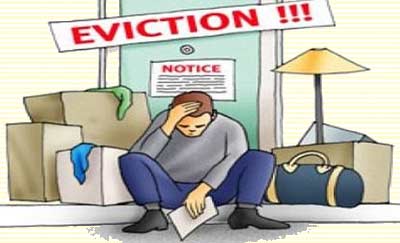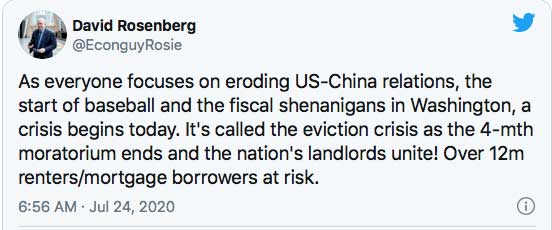Eviction Moratorium Expires Today, Putting Millions Of Renters At Risk
Tyler Durden
 The Federal Housing Administration (FHA) was able to stop evictions of renters during the coronavirus pandemic. The Coronavirus Aid, Relief, and Economic Security Act (CARES) also made it unlawful for landlords to evict tenants in federally subsidized or federally backed housing. However, those protections are set to expire today (Friday, July 24). The Federal Housing Administration (FHA) was able to stop evictions of renters during the coronavirus pandemic. The Coronavirus Aid, Relief, and Economic Security Act (CARES) also made it unlawful for landlords to evict tenants in federally subsidized or federally backed housing. However, those protections are set to expire today (Friday, July 24).
Washington D.C.-based think tank Urban Institute estimates the eviction moratorium, expiring today, could put more than 12.3 million renters at risk of losing their home.
This protection can help stabilize renters during an economically precarious time, but it doesn't cover everyone. We estimate that eviction moratoria covering federally financed properties will apply to roughly 12.3 million (28 percent) of the 43.8 million US rental units. - Urban Institute wrote
What this means is that landlords will begin filing eviction paperwork for tenants who haven't paid rent for 30 days, and or, as we've noted, some folks haven't paid rent in months. While it's customary renters get 30 days' notice, an eviction wave is ahead.
The end of eviction protection comes as households are being hit with a fiscal cliff. The $600 in weekly federal unemployment assistance for tens of millions of folks is set to expire next week. We've called it an "income cliff," as it would mean consumption would crater, and the recovery would quickly reverse.
The Trump administration is attempting to pass another round of the stimulus. So far, there are no proposals to extend the moratorium.
Sharon Parrott, senior vice president for federal policy and program development at the Center on Budget and Policy Priorities, said earlier this week that at least 20% of renters are behind in payments.
Advocacy group COVID-19 Eviction warns the actual number could be between 19 million and 23 million families face evictions this fall.
The Washington Post noted the House had passed legislation to create a rental assistance fund, which would support low-income renters for two years. The Senate has yet to review the bill.

With millions of folks unable to pay rent, how in the hell can there be a V-shaped recovery?
 our mission: our mission:
to widen the scope of financial, economic and political information available to the professional investing public.
to skeptically examine and, where necessary, attack the flaccid institution that financial journalism has become.
to liberate oppressed knowledge.
to provide analysis uninhibited by political constraint.
to facilitate information's unending quest for freedom.
our method: pseudonymous speech...
Anonymity is a shield from the tyranny of the majority. it thus exemplifies the purpose behind the bill of rights, and of the first amendment in particular: to protect unpopular individuals from retaliation-- and their ideas from suppression-- at the hand of an intolerant society.
...responsibly used.
The right to remain anonymous may be abused when it shields fraudulent conduct. but political speech by its nature will sometimes have unpalatable consequences, and, in general, our society accords greater weight to the value of free speech than to the dangers of its misuse.
Though often maligned (typically by those frustrated by an inability to engage in ad hominem attacks) anonymous speech has a long and storied history in the united states. used by the likes of mark twain (aka samuel langhorne clemens) to criticize common ignorance, and perhaps most famously by alexander hamilton, james madison and john jay (aka publius) to write the federalist papers, we think ourselves in good company in using one or another nom de plume. particularly in light of an emerging trend against vocalizing public dissent in the united states, we believe in the critical importance of anonymity and its role in dissident speech. like the economist magazine, we also believe that keeping authorship anonymous moves the focus of discussion to the content of speech and away from the speaker- as it should be. we believe not only that you should be comfortable with anonymous speech in such an environment, but that you should be suspicious of any speech that isn't.
www.zerohedge.com
| 



